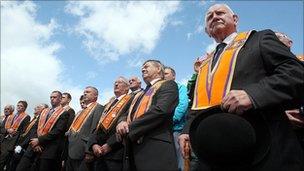Draft parades laws 'in chaos' as Orange Order says 'no'
- Published

Proposals for new legislation to deal with contentious parades are in chaos after the Orange Order rejected them.
Thirty-seven members of the Grand Lodge voted against the draft laws, saying they could not accept them in their present form.
It is understood the DUP - which negotiated the proposals in the wake of the Hillsborough Deal - is unhappy.
Party sources said that unless the decision was overturned, it would spell the end for the new parades proposals.
A senior political source told the BBC that if the proposals were withdrawn, the Order would effectively be stuck with the Parades Commission, a body it refuses to recognise.
It is understood the Grand Lodge may have to meet again to discuss the code of conduct in the new draft legislation.
DUP sources said this was "a source of comfort" and they were hopeful that the outcome of that meeting might be different.
In a statement on Wednesday, the Grand Lodge said it was not prepared to accept the draft law "in its present form".
Thirty-seven Lodge officers voted against and 32 voted for the proposals. There were four abstentions when the Order held its vote in County Tyrone on Tuesday evening.
The Order said they would meet soon to discuss the vote and look at the code of conduct which is out for consultation until September.
'Committed'
In a statement released on Wednesday afternoon, the DUP members of the Parades Working Group, Jeffrey Donaldson, Nelson McCausland and Stephen Moutray said the party was committed to advancing the rights of the loyal orders.
"We are the only party to have put proposals on the table to deal with issues surrounding parading and protests, based upon upholding the fundamental right to freedom of public assembly.
"We are working towards the complete abolition of the Parades Commission - something which we understand all the loyal orders agree is a necessary step," they said.
The men said they had worked closely with the Grand Orange Lodge to advance a positive agenda. They said they respected the views expressed by the lodge and looked forward to any suggestions following the Lodge's deliberations.
The DUP and Sinn Fein set up a six-strong group to work on the matter after the Hillsborough Agreement in January.
The parties' brief was to propose a new and improved framework to rule on controversial marches, including a focus on local solutions, mediation and adjudication.
The proposals focus on dialogue and a code of conduct for both residents and marchers. They also spelled the end of the Parades Commission.
One of those who sat on the working group, Sinn Fein MLA John O'Dowd, said that the vote showed the Orange Order needed to "wake up".
"The days of the Orange Order dictating policy are over. The days of the Orange State have gone," Mr O'Dowd said.
'Backroom'
He added that the legislation had come about as a result of "political agreement between elected parties" and was going through the due legislative process.
"That is how is should be, not decided in the backroom of some Orange Hall," Mr O'Dowd said.
"The fact that the Orange Order has not even made a submission to the consultation shows the contempt they have for the normal democratic process."
Tom Haire, County Grand Master of Belfast, said that he was surprised at the Order's decision.
"I thought there may have been some kind of accommodation with a number of reservations," Mr Haire said.
"It looks like the Parades Commission is still in position and I would say that whatever decision the Grand Lodge took last night, it would not compromise their overall view that they want to see the demise of the Parades Commission."
It is understood that the Grand Master of County Armagh Denis Watson and other officers in the county last week declined the offer of a meeting with the First Minister Peter Robinson.